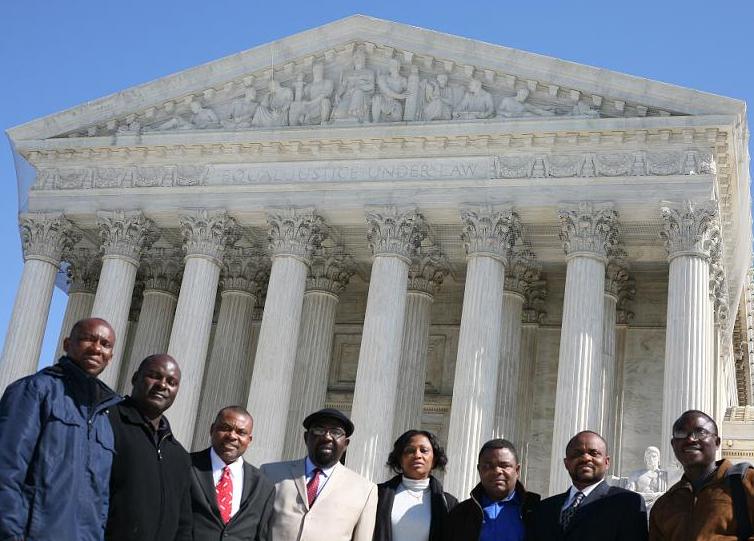
Members of the Ogoni community outside of the Supreme Court, February 28, 2012. Esther Kiobel, center. (Photo by Erica Razook)
On Monday, the U.S. Supreme Court will hear oral arguments in Kiobel vs. Royal Dutch Petroleum Co., a corporate accountability case that could have far-reaching implications for future efforts by survivors of human rights abuses committed in other countries to sue those responsible in U.S courts. The case is close to my heart, but its outcome is one that all human rights activists should be invested in.
Earlier this week, in the course of sorting through years of accumulated documents in preparation for our impending office move, I found the four overstuffed binders I created over a decade ago while researching cases for Amnesty’s 2002 report, United States of America: A Safe Haven for Torturers. The report examined the U.S. government’s failure to fulfill its obligation to investigate and prosecute individuals found in the U.S. who are accused of torture committed in other countries, and to ensure that survivors can obtain reparation in U.S. courts.
The landmark ruling in turn opened the door to more cases and some measure of accountability for survivors who would otherwise have no chance of obtaining it at home.
On the first human rights case brought under the Alien Tort Statute in 1980.
You can’t hear these stories and not be overwhelmed with sadness, frustration and anger. The abuses — torture, rape, disappearances, executions, massacres – are horrifying, and they’re compounded by the fact that not only do the vast majority of those responsible get away with it, they tend to thrive: they retain or assume positions of power in the government, enjoy great wealth – particularly in comparison with and often at the expense of their victims — and they’re treated with honor when they travel abroad.
In an effort to tip the scales of justice back toward survivors, Amnesty International in 1998 helped found the Center for Justice and Accountability (CJA) to help survivors of abuses file lawsuits in U.S. courts against perpetrators who come to the U.S. CJA and others are able to do this thanks in large part to the Alien Tort Statute (ATS), which was enacted in 1789 to give U.S. courts jurisdiction over claims brought by non-citizens for violations of international law.
The first human rights case under the ATS was in 1980, when the Center for Constitutional Rights brought a wrongful death suit on behalf of a Paraguayan family against a Paraguayan police officer for the kidnapping, torture and death of 17-year-old Joelito Filártiga in Paraguay. The Filártigas were ultimately awarded a $10.4 million judgment, in which the court held that torturers, like the pirates who originally inspired the ATS, are the enemies of all humankind. This landmark ruling in turn opened the door to more cases and some measure of accountability for survivors who would otherwise have no chance of obtaining it at home.
Every American should take pride in the fact that U.S. courts offer survivors of human rights abuses — regardless of where the abuses were committed — an opportunity to have the truth of what was done to them established in a court of law. In so doing, we honor their inherent dignity and value as human beings and send a message to perpetrators that the U.S. will not be a safe haven for human rights abusers.
In the years since Filártiga, the scope of such suits has broadened to encompass corporations involved in human rights abuses, reflecting the fact that non-state actors increasingly pose just as great a threat to human rights as state actors. But as we should all know by now, human rights and justice alike require endless vigilance, and so it is that these ATS cases are under threat.
On Monday, the U.S. Supreme Court will hear arguments in the case of Kiobel vs. Royal Dutch Petroleum Co., which tackles the issue of whether corporations can be sued in U.S. courts under the Alien Tort Statute for violations committed abroad. The lead counsel is someone very near and dear to the Amnesty movement, Paul Hoffman, former Chair of the Amnesty International USA Board, former Chair of Amnesty International’s International Executive Committee, a pathbreaker in bringing such cases, and a hero for human rights.
The Kiobel case was first filed in 2002 in New York by a group of Nigerians alleging that three international oil companies helped the Nigerian government torture and kill environmental activists who were protesting oil operations in the Niger Delta. Eventually the case wound its way to the Supreme Court, where the defendants challenged not just whether the ATS applies to corporations, but whether the ATS should apply to violations of international committed abroad at all. This is the question that will be argued on Monday, and the fate of future ATS cases like the ones described in this post hangs in the balance.
I have so much admiration the perseverance and courage of Paul and Esther Kiobel and her co-plaintiffs, who have carried this case forward despite daunting odds and despite the powerful actors who have lined up against them. The U.S. Chamber of Commerce and a host of companies– including Coca-Cola, Chevron, Dole, IBM, GE, Caterpillar and others — have piled on in support of the defendants. And they’re joined, sadly, by the Obama administration, who has argued that the lawsuit should not be allowed to go forward.
William Aceves, who authored both Safe Haven and a documentary history of the Filártiga case, explained that he did so “…to remind us that every case tells a story. Every story marks a life. Every life has meaning.”
I hope the Supreme Court justices realize this, too.

This is an amazing and brave step forwards for oil victims in the Niger Delta, I wish the Kiobels' the best of luck!
I'm a little confused, would the TVPA not allow for torturers to be sued here for torture or extrajudicial killings committed abroad?
The tvpa hasn't even worked very well for survivors IN this country. I hope these people win their case and maybe we can start using in the U.S. on cases in the United States.